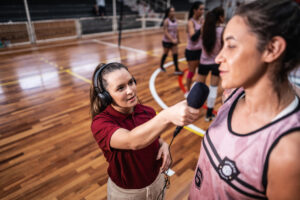‘The charge, the challenge, the opportunity’: AAPI comms leaders lift their VOICES
The new group was formed to help AAPI communicators feel seen and heard.

Only 2.3% of the communications industry is made up of Asian Americans, according to the Bureau of Labor Statistics. That statistic spurred the formation of VOICES, a new organization by and for communicators of Asian American and Pacific Islander descent, which held its inaugural panel discussion on March 1.
Panelists discussed their reasons for forming VOICES, highlighting their intentions to using their skills as communicators to challenge stereotypes amid a rise in acts of violence against the AAPI community and create a mentorship pipeline to support AAPI students who are just beginning their careers.
“There’s something to be said for being able to look up and see someone like you in a place where you think you want to go,” said moderator Patricia Ratulangi, VP of global communications at Nielsen.
Widening the frame of visibility
Soon Mee Kim, chief diversity equity and inclusion officer at Omnicom PR Group, asked attendees to visualize the Golden Spike Ceremony that marked the completion of the Transcontinental Railroad in 1869. She described a famous photo that included people cheering and toasting – but excluded the over 20,000 Chinese immigrants who were largely responsible for building the railroad.
“For too long, Asian Americans and Pacific Islanders have been missing from the picture,” Kim said. “We belong in marketing, communications, and creative industries. We belong in leadership and in the boardroom. We belong wherever decisions are made when people are involved. We belong here.”
Debunking the ‘model minority’ myth
Panelists attacked the myth that AAPI leaders serve as a ‘model minority’ in communications, noting how positive stereotypes gloss over the fact that many AAPI people still face struggles in the field.
“I’m tired of being invisible,” said Bill Imada, chairman and chief connectivity officer at IW Group. “We want to be seen and heard in all areas of communication. The only way this will happen is when we, as a community, recognize that our stories and experiences are important and meaningful.”
“We are not just STEM,” added Kim, referring to the fields of science, technology, engineering and math. “We are so many things. And so I just want to encourage folks that have chosen this field. I think that storytellers, the communicators, we are the ones who actually have such great impact.”
Using comms skills to emphasize impact
Cynthia Sugiyama, head of communications for diverse segments, representation and inclusion at Wells Fargo shared how that impact can expand during a time when acts of violence against the AAPI community are on the rise. In March 2021, she wrote an op-ed for the San Francisco Chronicle on how the crisis was an inflection point for her. The piece spurred a number of internal conversations, which led to greater senior leader engagement and advocacy initiatives at the bank.
“As I think about the last two years – everything we’ve gone through, everything we have seen unfold in the AAPI community specifically – it felt as though now was that moment we could seize to use our voices in a way that we hadn’t before,” she said. “We’re seeing more and more people in the broader AAPI community use their voices. And we as communications professionals even more have the charge, the challenge, the opportunity to elevate our voices to help support that next generation of communicators.”
Supporting the next generation of AAPI communicators
The panelists explained how providing that support to the next generation of communicators was central to the organization’s mission.
“Having been a student at one point, I have gone through periods where I felt a little lost and didn’t feel like I had any organizations to turn to for support or mentorship,” added Jackie Liu, VP at Pollack Group. “And while there was great value to it, I didn’t feel like PRSA was necessarily for me. I wanted to be the anchor and the support and provide that for young people coming up at the same time.”
Roela Santos, VP of communications and marketing at BAE systems, shared how this focus led to mentoring a diverse group of PR students at the University of Florida, who also helped design the website and other assets for VOICES.
“We have to catch up, because they’re passionate and energized to make a difference and be out there and form that community,” Santos said. “Hopefully they understand and appreciate that they’re not alone in that there’s a bunch of us in the background, cheering for them and cheering for their success.”
Get involved with VOICES at voicesforaapi.com.







